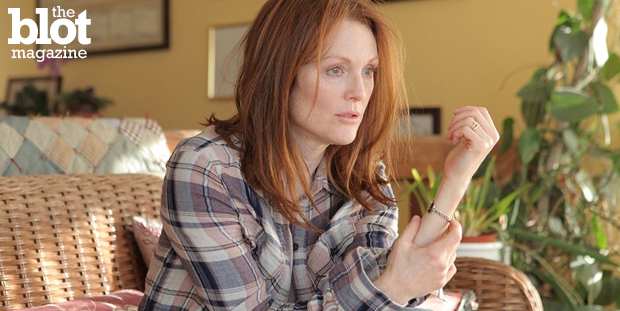When I first received the invite to screen “Still Alice,” I thought, “Oh, no. Too depressing.” I went anyway because I knew this cast can pick and choose their roles, so there must be something here of value. Boy, is there!
Julianne Moore playing Alice elevates this film to a level that makes it a no-brainer why Moore just won Best Actress at the Golden Globes. The Oscar nominations were just announced, and she gets a chance to win there also. She deserves it.
Alice is a Columbia linguistics professor. She’s happily married to John (Alec Baldwin), and they have three grown children. The youngest is daughter Lydia (Kristen Stewart), a willful creative type who wants to find her own way. Anna (Kate Bosworth) is the responsible older and married sister. Their son, Tom (Hunter Parrish), is more of a background character, but he seems just fine — a healthy, happy son.
The first signs of mental illness show while Alice is lecturing a class and freezes. She cannot remember a word. But doesn’t that happen to everyone? Yes, but what about when you begin forgetting conversations you just had? In one powerful scene, Alice becomes confused in her own home. She begins opening all the doors in the house because she can’t remember where the bathroom is.
Alice gets the devastating diagnosis: It’s early onset Alzheimer’s. Moore is so believable in the role, it’s chilling. She communicates through the slightest of movements in her face. We see things from her perspective. She is strong, she has even more stubborn drive than Lydia. “Still Alice” is a movie that shows how valuable our lives are when we stay in the moment and don’t take anything for granted.
Thanks to the strong and sensitive screenplay by Wash Westmoreland and Richard Glatzer (who suffers from ALS, by the way), the movie does not feel like a Lifetime channel tearjerker. Lisa Genova also deserves loads of credit for writing the book the script is based on.
It was a thrill to have the opportunity to speak with the actresses from the film for TheBlot Magazine.
Dorri Olds: When fleshing out a role, does it help if you’ve played similar characters before?
Julianne Moore: I tend not to work that way. I think sometimes when you look at someone’s career, you look for threads and references, but believe it or not, as actors, we’re freelancers who literally go from job to job so you make a movie and then the next one and the next one. Then, when someone asks me about a movie I made 10 years ago, I barely remember it. Often people remember things in my movies and quote lines, and I’m like, “What’s that?”
Poor Michael Angarano. He’s so great and so cute and funny. We were doing this little comedy called, “The English Teacher,” and we had to kiss in it. He told the story on “Letterman” or something. We kissed and he said, “Was that sexy?” And I went, “Yeah, Michael, that was great. You were terrific.” He said he wanted to die of embarrassment because he was quoting a line from “Boogie Nights.” [Laughs]
But, getting back to your question, I think everything you do as a person and everything you do as an actor ends up in your work, but it’s not that direct. It’s all just like life — accumulative.
What was your reaction when you got the script? Were you afraid a movie about Alzheimer’s would make people say “That’s depressing” and not want to see it?
Kristen Stewart: Typically, no. Every experience is different when you’re an actor and doing it for the reasons we do. Yeah, it’s definitely morbid, and it’s not a walk in the park, but sometimes, it sounds silly, but sometimes filmmaking can be very important. As soon as I read Julianne’s part in this, I knew that she was going to be doing something important. I knew this movie was being made so she could do something that would say something. It was intimated to me that it was our job to just hold her up. There’s a reason that I possibly felt so driven about this film is because Wash [Westmoreland] and Rich [Glatzer] hired me. I felt like if they thought I could do it, then I could. It’s not that I don’t like that people can go to the movies and laugh, but sometimes I think a movie can really say something.
Kate Bosworth: I felt the same way. I’d read the book before the script, and I think everyone in some way knows someone who has been effected by Alzheimer’s. In my family, both grandparents had Alzheimer’s, and my parents rallied the family to take care of them, and that touched me deeply. I felt like this is an opportunity to shine a light on this disease in a way that hadn’t been done dramatically before. That was the real draw for me and to be able to work with Julie [Moore]. I’ve known her for years, but never had the opportunity to work with her before. I was excited to be able to watch her. It’s incredible and spectacular to be around her and be part of the process.
Moore: I did it for the money. [Laughs] No, sorry, it was just such a great script, a wonderful, wonderful script and such a great book that Lisa [Genova] wrote. What she did that is so remarkable is that she presented the disease completely subjectively. What would it be like? What does it feel like to go through this process? We never get to see that. And, Rich and Wash took that novel and made it cinematic in a very deceptively simple way, I think. It was a thrill to be involved in something like that, and I think that’s what attracted us to it. It’s the human side of the story. You’re watching this family’s journey through this very difficult situation.
Stewart: It’s interesting that this is the kind of story where you know if it is done right, everyone is going to talk about it. If it were done badly, well … [Laughs]. Do you know what I’m saying? The alternative is so polarized. So I thought, “If we do it right, it’s going to be more important than anything we’ve done in a long time.”
“Still Alice” earned Moore a Golden Globe for Best Actress and an Oscar nomination.
The film also won Official Selection at the Toronto International Film Festival.
“Still Alice” opens Friday, Jan. 16. Drama. Rated PG-13. 99 min.
Watch the trailer:
Watch excerpts of this interview:
Dorri Olds is a contributing journalist for TheBlot Magazine.










One Comment
Leave a Reply